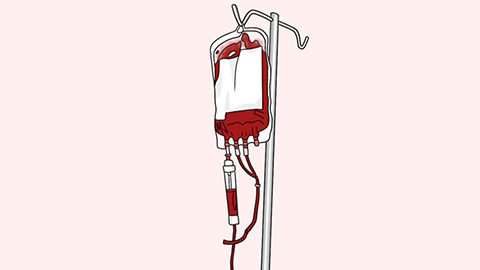What are the causes of hemolytic transfusion reactions?
In general, hemolytic reactions during blood transfusion may be caused by factors such as blood type incompatibility, improper blood storage, autoimmune hemolytic anemia, drug-induced hemolysis, or infection-related hemolysis. It is recommended to seek medical attention promptly, identify the underlying cause, and receive symptomatic treatment under a doctor's guidance. Specific analyses are as follows:

1. Blood type incompatibility: If donor and recipient blood types are not accurately verified before transfusion—for example, transfusing type A blood into a patient with type B blood—it can trigger an antigen-antibody reaction leading to hemolysis. Strict blood typing and cross-matching tests must be performed. During transfusion, the recipient’s vital signs should be closely monitored, and the transfusion should be stopped immediately if any abnormalities occur.
2. Improper blood storage: If blood is stored at excessively high or low temperatures, or for too long, red blood cells may rupture, causing hemolysis after transfusion. Blood storage protocols must be strictly followed, maintaining storage temperature between 2–6°C. Only blood within its expiration date should be used, and the appearance of blood should be inspected before transfusion.
3. Autoimmune hemolytic anemia: In this condition, the body produces autoantibodies that attack its own red blood cells. Transfusion may exacerbate hemolytic reactions. Patients often present with symptoms such as jaundice and fatigue. As directed by a physician, patients may take medications such as prednisone tablets, methylprednisolone tablets, or dexamethasone tablets to suppress immune responses and improve hemolysis.
4. Drug-induced hemolysis: Certain medications, such as penicillins and cephalosporins, may trigger red blood cell destruction and lead to hemolysis. Patients may exhibit symptoms including hemoglobinuria and anemia. The causative drug should be discontinued immediately. Under medical supervision, patients may be treated with azathioprine tablets, cyclophosphamide tablets, or mycophenolate mofetil capsules to alleviate hemolytic symptoms.
5. Infection-induced hemolysis: Infections such as Epstein-Barr virus (EBV) infection or mycoplasma infection may damage red blood cell membranes and result in hemolysis. Patients may experience symptoms like fever and chills. Active treatment of the infection is required. As prescribed, patients may take acyclovir tablets, azithromycin dispersible tablets, or levofloxacin tablets to control the infection and reduce hemolytic reactions.
Before and after blood transfusion, close monitoring of the recipient’s physical condition is essential, along with accurate documentation of transfusion-related information. Recipients with pre-existing medical conditions or a history of medication use should inform healthcare providers in advance so preventive measures can be taken to minimize the risk of hemolytic reactions.





